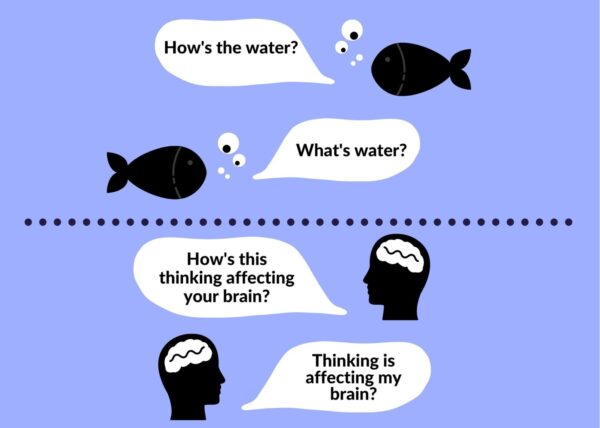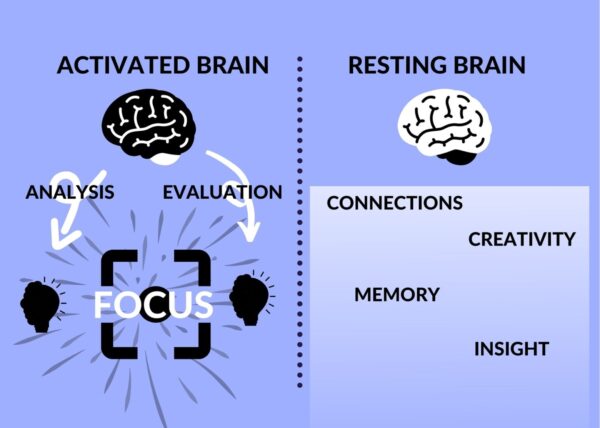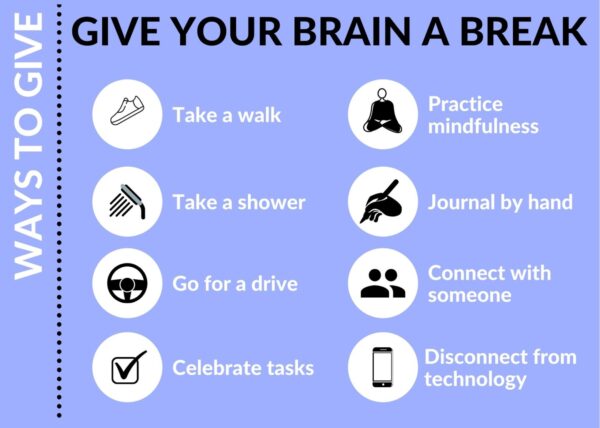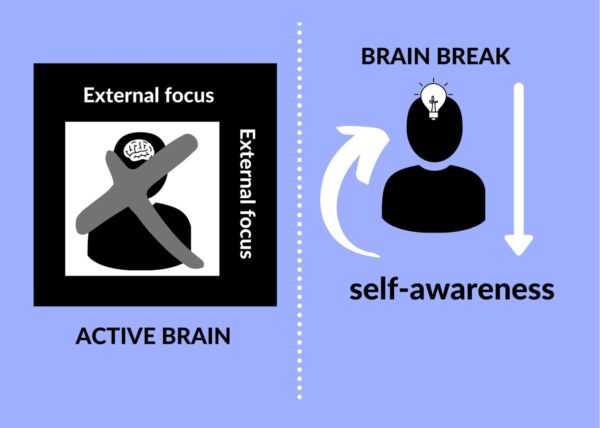Downtime for your mind is not just a good idea. It’s a necessity. Learn 8 ways to give your brain a break and take mental downtime time.
If you talk to any high-performing athlete, they’ll tell you how important it is to schedule recovery days in their workout calendar. During the downtime, your body isn’t doing nothing. Instead, it’s gearing itself up for peak activity. Your muscles heal, your organs replenish their reserves, and your body primes itself for improved performance.
A similar process happens in our brains. When you give your brain a break, you allow it space to reach its peak performance.
Unfortunately, the majority of us don’t give our minds this necessary downtime.
Now I’m not saying that all of our mental powers are equivalent to Olympic athletes’ physicality. A few days ago, I spent ten minutes searching for my phone when it was in my pocket. Still, this mental lapse has less to do with my intelligence and more to do with how I’m treating my brain.
My treatment is not good, for the record. And I’d guess neither is yours.
.
What Our Brains Do When Activated
The majority of us neglect our brains as a working entity. This may seem surprising, as we spend a great deal of time thinking. (And, if you’re like me, overthinking.) However, the more we’re stuck in our heads, the less likely we are to realize we’re in our heads.
It’s kind of like the fish joke. One fish swims up to another fish and asks, “How’s the water?” The second fish replies, “What’s water?”
You’re in your activated brains, my friends, whether you know it or not.
When your brain is activated, it’s continuously analyzing and evaluating the tasks and information at hand. Our brains are working in Doing mode (as opposed to a Being mode). In this mode, it’s focused on what’s at the forefront of our attention.
Picture this mode like a college student in a library during finals week (because the more stress, the better). He’s sitting at a table with stacks of papers and books in front of him. Sure, he might be shifting from book to paper to his to-do list. But his mind is always focused on the table in front of him.
There’s nothing wrong with this focus. After all, dedicated focus allows us to be productive, solve problems, and accomplish our goals.
The problem comes in when we don’t give our brains a break.
Read my post about Doing Versus Being: How to Escape the Productivity Obsession.
.
Why You Need to Give Your Brain a Break
Eventually, our college student is going to need to step away from the table. He’ll have to take care of some basic survival needs, of course (like eating and bathroom breaks (we can only hope)). He’ll also need to let his mind recover.
When you give your brain a break, you allow it to switch into an entirely different mode. Your mind transitions from “doing” to “being.” In doing so, it turns down the “focus” dial and lets background functions take over. These functions include making connections, storing memories, and being creative.
You might be wondering, Can’t I do all these things when I’m in Doing mode?
An excellent question, but no – you can’t. No matter how “free” you think you are, Doing mode keeps you stuck at the table in front of you. Even if you do stretch or look around, you can only see so far.
Another way to think of this is through the metaphor of noise. Our brains need periods of quiet to recover. Yet we live in a constant world of noise. This noise can be audible (such as TV, podcasts, or talking), but it can be inaudible. Tasks, media, planning, and technology all create noise in our brains that doesn’t let our background brain functions kick in.
Whenever we’re focused on something, we’re closing the door to being open to other things.
Mental downtime allows your brain benefits that focused activity can’t produce. It also gives your brain its much-needed refresher.
.
Benefits When You Give Your Brain a Break
Giving your brain a break isn’t just for feeling good. Mental downtime for your mind is necessary for vital functions.
-
You strengthen your memory.
In our information and quick-paced society, we move from thing to thing in quick succession. These rapid transitions don’t allow ourselves the time to lock it into memory. Our brains need time to reflect on new information to store it in long-term memory. By giving your brain a break, you create opportunities for the items you focused on to be stored away.
-
You improve your attention.
The average attention span for humans is becoming terrifyingly short. Between our technology and environment, our society is full of continuous distractions. Unfortunately, most of us lack the self-awareness to realize when we’re distracted. (We’re also incredibly triggered by these distractions.) Giving your brain a break strengthens your awareness and, ultimately, your attention.
-
You tap into greater insight and creativity.
When we pause the “focused” part of our brain, we make room for other sections of our brain to fire up. A bunch of synapses and elements turn on in the Being mode. Even when we’re not actively thinking, our brains make connections and come up with new ideas in the background. This is why we experience our “aha” moments in quiet times, rather than focused times. It’s in mental downtime that you’ll tap into greater insight and creativity.
-
You untangle emotion and thoughts.
As if our brains aren’t complicated enough, our emotions add a layer of confusion to the dynamic. Humans are driven by feelings more than thinking (even though we think it’s the other way around). When our brains are activated, we fail to recognize how our bodies feel. In turn, this creates a lack of self-awareness about how our feelings are affecting what we’re doing. Giving your brain a break will allow you to untangle your emotions and their influence on your thoughts.
-
You avoid mental fatigue.
Mental fatigue is a thing, and it’s becoming more and more prevalent in our “more-more-more” culture. Our brains can only handle so many decisions and thoughts before we reach our mental capacity. Some studies even prove how a lack of sleep and mental downtime can lower your IQ. Our minds need rest just like our bodies too. And, while sleep is a great place for our minds to rest, we also need time while awake to let it reach its full potential.
.
8 Ways to Give Your Brain a Break
Our society is obsessed with productivity. We’ve come to define Doing and accomplishments as standards for success and self-worth. Unfortunately, many of us fall prey to this cultural narrative. As a result, we limit our potential by not giving our brains a break.
By incorporating little habits into your life, you can create opportunities to give your brain a break. It’ll be worth it.
1. Take a walk
One of the best ways to get out of your head is to connect with your body. This physical connection is why exercise has so many benefits. Fortunately, you don’t need to dive into an intense workout to give your brains a break. Taking a walk is an easy yet effective way to give your mind a break. When you go for a walk, make room for quiet in your brain. You can listen to music, but you should avoid listening to podcasts or talking to someone. You want your brain to engage in un-focused mental downtime.
2. Take a shower
Have you ever heard people exclaim how much insight they gain in the shower? I’d guess that it’s not the soap bubbles or water pressure that’s leading to these moments of clarity. (Although a hot shower after a cold day is heavenly in its own right.) Showers force us to turn down the noise and live in the present moment. We’re forced to disconnect from our work and technology. If you want to give your brain a break, hop in the shower. (Your improved hygiene will just be an added bonus.)
3. Go for a drive
If you’re not feeling like a shower, going for a drive can provide a similar distraction-free opportunity. Driving has become second nature for many of us, leaving our minds to wander and engage in “quiet” mental downtime. For the sake of your mental downtime (and the safety of others), fight the urge to be a distracted driver. Instead, lean into the opportunity to give your brain a break.
4. Celebrate a completed task
Have you ever moved through your to-do list with the speed of an over-caffeinated workaholic? Your productivity is worth celebrating, yet we don’t allow ourselves to stop and do so. When we move from one task to the next, we continuously plan for the future and surrender a critical moment for reflection. After you complete something, pause and celebration your accomplishment – no matter how big or small it was. You don’t need to throw yourself a party; even a few seconds will give your break a break it needs to recover and appreciate your work.
5. Practice Mindfulness
Mindfulness doesn’t need to be a ten-day yoga retreat in the mountains (although, if that inspires you, by all means – go for it!). For most of us, mindfulness can be tapping into our senses. You can also incorporate deep breathing, guided mediation, or yoga. When we give our brains a break, we develop an awareness of the present. This allows our minds to recover.
6. Journaling by Hand
It might seem contradictory to advise journaling as a way to “give your brain a break.” After all, aren’t you thinking while you journal? While journaling might not be the most mindful option, it can still help your brain shift from an activated mode to a resting mode. Particularly when you journal by hand. Journaling will force you to slow down your thoughts, focus on the present, and give yourself the time to process things without the constant “go-go-go” noise.
7. Connect with someone
Earlier, you labeled talking as noise, and now you’re advising me to connect? That’s correct (and well done for paying attention!). The vital distinction is that genuine connection involves being with someone, fully present, and in the moment. Whether you’re talking or listening, your brain is not in Doing mode. Instead, you’re giving your brain a break by Being with someone else.
8. Disconnect from technology
Disconnecting from technology is so crucial in giving your brain a break. Too often, we think we’re engaging in mental downtime when we’re on our phones or mindlessly scrolling. In these moments, we’re neither present nor intentional with our brains. Quite the contrary, we’re even more susceptible to the triggering effects that our environment has on us. To give your brain a break, disconnect from all your technology. Turn off your notifications and “unplug” your mind from the distractions it learned to crave. Unplugging your home and doing a complete digital detox will do wonders for your mental health. (Not sure how to go about doing a digital detox ? Read these digital detox tips to achieve the results you’re looking for.)
.
Improving your Self-Awareness will help you Give your Brain a Break.
In addition to the overstimulated world that we live in, another key culprit provides an obstacle for mental downtime. We lack self-awareness.
And if you think you’re self-aware after reading this, then you’re most definitely not. (You’re also a part of the 80% of people who think that they’re more self-aware than they are.) Listen, it’s not your fault. Our evolutionary roots and brain wiring makes it incredibly challenging to be self-aware. (Yup, there our brains go again… messing things up.)
Self-awareness doesn’t develop in our focused, activated brain modes. It’s in these moments that we’re least focused on ourselves, precisely because we’re so focused on external things.
When you give your brain a break, you expand the scope of your awareness. More often than not, these quiet periods will allow you more insight into your own emotions, actions, and thoughts. You’ll be able to better align who you are with what you’re doing.
And, if your brain is rested enough, you’ll be able to use this self-discovery to create a more meaningful life.
[/fusion_text][fusion_code]PGlmcmFtZSBpZD0iaW50ZXJhY3RBcHA1ZjhjNTE0NjdkZDM1NTAwMTQzYTQ4ZDgiIHdpZHRoPSI4MDAiIGhlaWdodD0iODAwIiBzdHlsZT0iYm9yZGVyOm5vbmU7bWF4LXdpZHRoOjEwMCU7bWFyZ2luOjA7IiBhbGxvd1RyYW5zcGFyZW5jeT0idHJ1ZSIgZnJhbWVib3JkZXI9IjAiIHNyYz0iaHR0cHM6Ly9xdWl6LnRyeWludGVyYWN0LmNvbS8jLzVmOGM1MTQ2N2RkMzU1MDAxNDNhNDhkOC9xLzE/bWV0aG9kPWlmcmFtZSI+PC9pZnJhbWU+[/fusion_code][fusion_text columns=”” column_min_width=”” column_spacing=”” rule_style=”default” rule_size=”” rule_color=”” content_alignment_medium=”” content_alignment_small=”” content_alignment=”” hide_on_mobile=”small-visibility,medium-visibility,large-visibility” sticky_display=”normal,sticky” class=”” id=”” font_size=”” fusion_font_family_text_font=”” fusion_font_variant_text_font=”” line_height=”” letter_spacing=”” text_color=”” animation_type=”” animation_direction=”left” animation_speed=”0.3″ animation_offset=””]
Conclusion
Our brains need mental downtime time to function at peak performance. When you give your break a break, you receive multiple benefits:
- You strengthen your memory
- You improve your attention
- You tap into greater insight and creativity
- You untangle emotion and thoughts
- You avoid mental fatigue
Unfortunately, our society promotes a culture of productivity and Doing. We also live in a world of information overload and distractions.
The more we can build mental downtime habits, the more creativity, meaning, and self-awareness we will experience in our lives.
There are 8 ways to give your brain a break:
- Take a walk
- Take a shower
- Go for a drive
- Celebrate a completed task
- Practice Mindfulness
- Journaling by Hand
- Connect with someone
- Disconnect from technology
Want to learn more about how self-aware you are? Take my free quiz to see what areas of your life you might be lacking in self-awareness.







